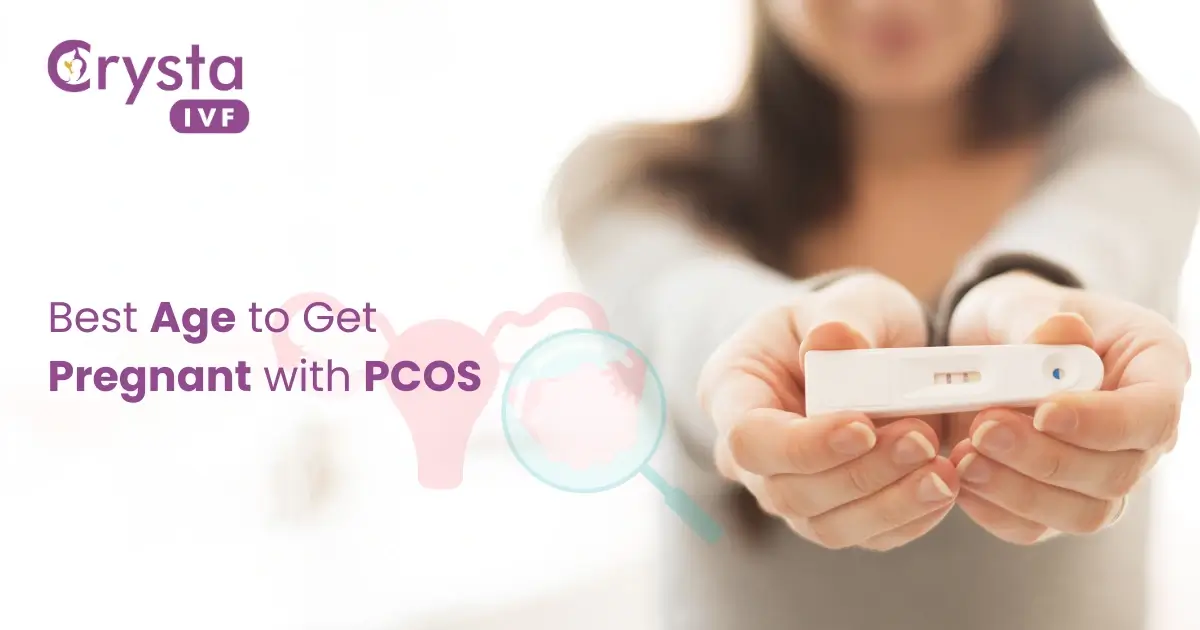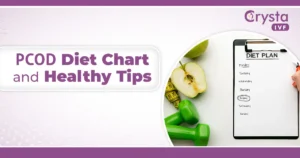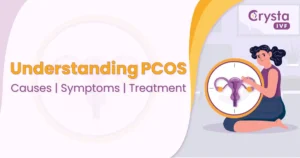PCOS, or Polycystic ovary syndrome, is a condition that affects the ovaries in women. It can cause problems like irregular periods and cysts on the ovaries. PCOS is a hormonal disorder that can bring about a range of symptoms, including irregular menstrual cycles, cysts on the ovaries, and hormonal imbalances. Women with PCOS have a three times higher risk of miscarriage in comparison to women without PCOS. PCOS makes the journey to motherhood a bit more complex. It can result in difficulties with ovulation, which is a critical factor in conceiving. Moreover, women with PCOS are at an increased risk of experiencing complications during pregnancy, such as gestational diabetes and high blood pressure. These challenges can be both physically and emotionally taxing.
The age at which a woman with PCOS decides to try to conceive plays a significant role in her chances of successfully having a baby and her overall health during pregnancy. In this blog, we will explore the aspects of age in PCOS and pregnancy journey. We will understand the reasons why age matters in the context of PCOS and pregnancy and how women can improve their chances of a successful pregnancy.
The Best Time To Get Pregnant For Women With PCOS
As women with PCOS or Polycystic ovary syndrome start aging, hormonal imbalances and metabolic issues can become more complex, making symptom management more challenging. This happens because the number and quality of a woman’s eggs decrease over time. However, the natural decline in fertility with age is an essential factor to consider while considering the best time to get pregnant for women with PCOS.
- Impact of age on fertility: By the age of 35, fertility begins to decline more rapidly, making it harder to get pregnant. This decline becomes steeper after the age of 40. Age significantly impacts fertility for all women. Women in their 20s have the highest fertility levels, and this is the best time to get pregnant for women with PCOS. As women approach their 30s, the chances of conceiving within a year of trying begin to decrease.
- Challenges for aged women with PCOS: In their 40s, fertility declines even more. Age is an essential factor because it can affect both the quantity and quality of a woman’s eggs, making it more challenging to achieve a successful pregnancy. For women with PCOS, the challenges related to fertility increase with age. PCOS can disrupt the regular menstrual cycle, leading to irregular ovulation or even a lack of ovulation. With the increased risk of health complications during pregnancy, the risk of miscarriages and birth defects increases.
PCOS Pregnancy Success Rate
The success rate for pregnancy among women with PCOS or Polycystic ovary syndrome may vary widely because success rates depend on various factors, including treatments and other health considerations. However, here are some general insights:
- Spontaneous Pregnancy: Some women with PCOS may achieve spontaneous pregnancy without medical intervention. The PCOS Pregnancy Success rate can vary, but it’s estimated that about 70-80% of women with PCOS will conceive within two years of trying to get pregnant.
- Fertility Treatment: When women with PCOS seek fertility treatments, PCOS pregnancy Success rate can vary based on the specific treatment method and individual factors. For example:
- Ovulation-Inducing Medications: Medications like clomiphene or letrozole are often prescribed to induce ovulation. Success rates with these medications can be 22% per cycle, depending on factors like age and the cause of infertility.
- Intrauterine Insemination (IUI): IUI, which involves placing sperm directly into the uterus, may have success rates of 10-20% per cycle.
- In Vitro Fertilization (IVF): IVF tends to have higher success rates, often ranging from 70%, depending on factors such as age and the specific circumstances of the individual.
- Age: Age significantly influences PCOS pregnancy success rate. Younger women with PCOS tend to have higher pregnancy success rates than older women with the condition because fertility naturally declines with age.
- Lifestyle and weight: Achieving and maintaining a healthy weight through diet and exercise can positively impact pregnancy success rates for women with PCOS, as excessive weight can exacerbate symptoms and reduce fertility. Weight loss and a healthy lifestyle may improve the chances of spontaneous pregnancy.
Advantages of Early Pregnancy For PCOS
Advantages of early pregnancy for women with PCOS include:
- Improved Fertility: Fertility naturally declines with age, and younger women with PCOS often have a better chance of conceiving without the need for extensive medical interventions.
- Reduced Complications: Younger women are at a lower risk for certain pregnancy-related complications, such as gestational diabetes and high blood pressure, which are more common in older women.
- Easier Symptom Management: PCOS symptoms tend to be milder in younger women, making symptom management and lifestyle modifications more effective.
- Better Response to Treatments: Younger women with PCOS may have a more favourable response to fertility treatments, increasing the likelihood of successful conception.
- Lower Risk of Age-Related Infertility: Delaying pregnancy can exacerbate age-related fertility issues, which may be more challenging to overcome for women with PCOS.
- Reduced Risk of Comorbidities: By starting a family earlier, women with PCOS can minimize the risk of developing associated health conditions like insulin resistance and type 2 diabetes.
- Healthier Pregnancy: Early pregnancy can result in a healthier pregnancy, with a decreased likelihood of complications, making it a safer and more comfortable experience.
- More Time for Family Planning: Starting a family early allows for more flexibility and time for family planning, spacing out pregnancies, and potentially having more children if desired.
Early pregnancies may offer long-term advantages by allowing women to complete their families and potentially experience a faster postpartum recovery, especially if they desire multiple children. However, the 20s are the best time to get pregnant for women with PCOS as this leads to a more relaxed and stress-free family-building experience, reducing the emotional toll often associated with fertility struggle.
What To Do To Increase The Chances Of Conception If You Have PCOS?
Increasing the chances of conception for women with Polycystic Ovary Syndrome (PCOS) can involve a combination of lifestyle changes, medical interventions, and other strategies. Here are some pointers on to getting pregnant with PCOS and what to do to enhance fertility with PCOS:
- Consult with your doctor: Start by discussing your desire to conceive with a healthcare provider or a fertility specialist at the IVF Clinic in Pune who can offer personalized guidance and recommendations.
- Weight Management: Maintaining a healthy weight through diet and exercise can significantly improve fertility and hormone balance. Weight loss may help regulate menstrual cycles.
- Lifestyle Modifications: Adopt a healthy lifestyle, including a balanced diet, regular exercise, and stress management. These factors can positively influence PCOS symptoms and fertility.
- Reduce Stress: High stress levels can affect fertility. Practice stress-reduction techniques such as yoga, meditation, or relaxation exercises.
- Quit Smoking and Limit Alcohol: Smoking and excessive alcohol consumption can negatively impact fertility, so consider quitting or reducing these habits.
- Regular Medical Check-Ups: Keep up with routine healthcare visits to the best IVF clinic in Pune to monitor your PCOS and its management.
- Dietary Choices: Focus on a balanced diet with whole grains, lean proteins, and plenty of fruits and vegetables. Minimize processed foods and added sugars.
- Avoid Trans Fats: Reducing trans fats in your diet can help manage PCOS symptoms and improve overall health.
- Regular Exercise: Engage in regular physical activity, as it can improve insulin sensitivity and promote weight management.
Be patient with the process. It can take time to achieve pregnancy, and it’s important to stay positive and not lose hope.
Treatment for PCOS to get Pregnant
Here are some options or treatments for PCOS to get pregnant:
- Ovulation-Inducing Medications: Your doctor may prescribe medications like clomiphene or letrozole to induce ovulation and regulate your menstrual cycle.
- Intrauterine Insemination (IUI): IUI involves placing sperm directly into the uterus, which can be an effective treatment for PCOS-related infertility.
- In Vitro Fertilization (IVF): IVF may be considered in more challenging cases, offering a higher success rate by combining egg and sperm outside the body.
- Monitor Ovulation: Use ovulation predictor kits or fertility tracking apps to identify your most fertile days and time of intercourse accordingly.
- Manage Insulin Resistance: If you have insulin resistance, your doctor may recommend medications like metformin to help manage blood sugar levels and improve fertility.
- Folic Acid and Supplements: Taking folic acid and other prenatal supplements can prepare your body for a healthy pregnancy.
Need help with pregnancy with PCOS?
PCOS, or Polycystic ovary syndrome, is a highly variable condition, and the experiences can differ. Success rates are also influenced by the presence of other health conditions, which may need to be managed to improve the chances of getting pregnant with PCOS. Here in this blog, we have explored the importance of age, the significance of preconception planning, and the role of healthcare professionals in assisting you on this path. However, with the right consultation, support, and determination, women with PCOS can take steps to optimize their fertility and increase their chances of a successful pregnancy. Consult with experts from the best IVF clinic in Pune to navigate the complexities of PCOS and create a personalized plan that suits your unique needs. Don’t hesitate to seek help; ask questions to your doctor. You are not alone in this journey, and there is hope for a fulfilling and joyous pregnancy despite PCOS.



